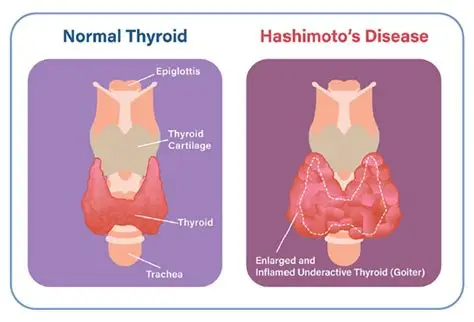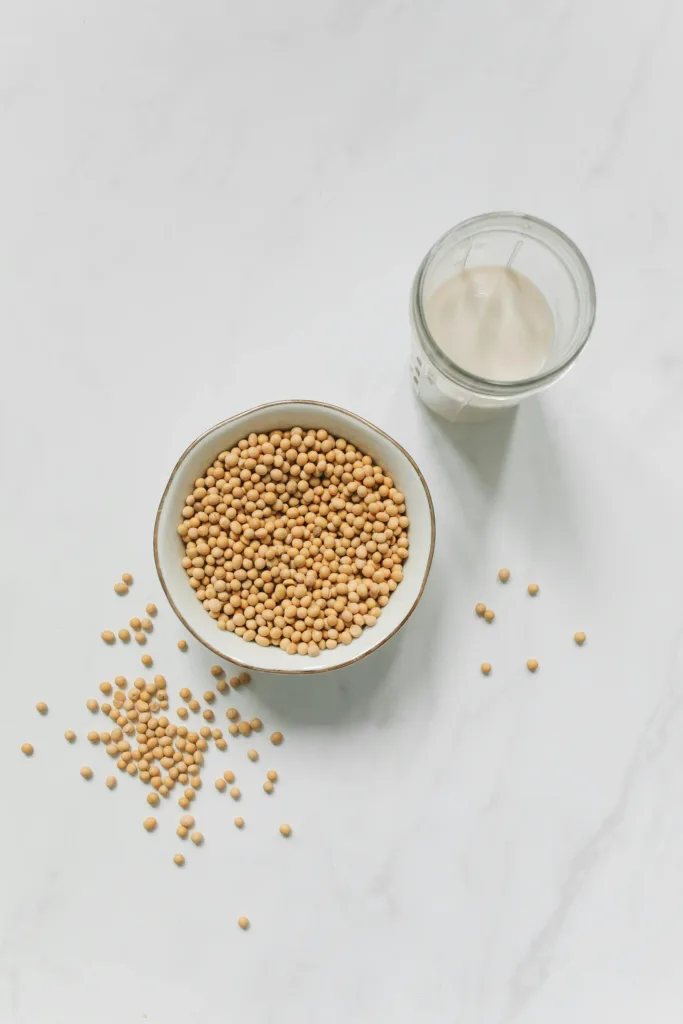Eating Plant-Based with Hashimoto’s: 5 Foods to Limit

Introduction
Eating plant-based foods with Hashimoto’s has its pos and cons. Here are the five foods to limit.
Here are facts for consideration.
There are many good reasons why people choose to go on a plant-based diet.
It’s a lifestyle loved for its incredible health perks. It helps maintain a healthy weight and lowers cholesterol and blood pressure.
The diet includes a colourful mix of fruits, veggies, whole grains, and legumes. These foods are packed with fibre, vitamins, minerals, and potent antioxidants.
For many, it’s a way to feel more energised, vibrant, and connected to their well-being.
Managing an autoimmune condition, like Hashimoto’s Thyroiditis, makes the path more complex.
This long-term illness is the leading cause of hypothyroidism. It happens when your immune system, which protects you, mistakenly attacks your thyroid gland.
This long-lasting attack causes inflammation. Over time, it can harm the thyroid’s hormone production. This leads to tough symptoms, such as:
- Persistent fatigue.
- Unexpected weight gain.
- Joint pain.
- Brain fog.
- A general feeling of being unwell.
For people with Hashimoto’s, diet goes beyond wellness.
It helps reduce inflammation, soothe the immune system, and maintain the body’s balance.
Here’s the challenge: how can you enjoy a plant-based diet while steering clear of foods that trigger your autoimmune symptoms?
It’s not about giving up your plant-based values. It’s about making smarter choices to help your body thrive.
This guide enables you to navigate that very question.
Let’s examine five foods you should limit or avoid on your plant-based journey. This can help your body feel its best.
The Guiding Principles of a Hashimoto’s Diet
Before we get into the details, let’s first look at the main idea of a diet for Hashimoto’s.
At its heart, it’s all about creating an environment where your body can heal and reduce inflammation.
Focus on Anti-Inflammatory Foods
First, the goal is to focus on anti-inflammatory foods.
Inflammation is the underlying driver of autoimmune flare-ups. Choose foods that calm inflammation in your body. This can directly help your symptoms.
Think of it as a proactive strategy to reduce the “fire” in your system.
Nutrient Density is Key
Secondly, nutrient density is key. Your thyroid is a small but mighty gland. It requires a steady supply of specific vitamins and minerals to function correctly.
You can get essential nutrients like iodine, selenium, zinc, and vitamin D from whole, unprocessed plant foods.
Eating these foods boosts your intake naturally so that you won’t need supplements.
Gut Health Connection
Finally, there’s a strong connection between gut health and autoimmune conditions.
Your gut houses a large part of your immune system. So, gut health directly affects how your immune response works.
Eating fibre-rich plant foods helps support a healthy gut microbiome. This is a great way to calm the immune system.
5 Foods to Limit or Avoid on a Plant-Based Diet for Hashimoto’s
Food 1: Gluten
If you’ve looked into Hashimoto’s, gluten is likely the first topic you encountered.
It’s usually the top dietary advice for people with this condition. There’s a strong scientific reason for it. The problem lies in a concept called molecular mimicry. Think of your immune system as a skilled security team. It spots and fights specific threats.
For someone with Hashimoto’s, the gluten protein gliadin closely resembles a protein in the thyroid gland. When you consume gluten, your body’s immune system launches an attack on the gliadin.
The two proteins look very similar. This confuses the immune system, which then attacks your thyroid at the same time. It’s a case of mistaken identity that can fuel the autoimmune response.
For someone on a plant-based diet, gluten can be a sneaky ingredient. It’s not just in the obvious places like bread, pasta, and baked goods.
But it is a primary component of seitan, a very popular and versatile meat substitute. It’s often a binder in mock meats, sauces, salad dressings, and some plant-based burgers.
Fortunately, it’s easier than ever to live a delicious, gluten-free, plant-based life.
You can easily switch to gluten-free options such as brown rice, quinoa, millet, buckwheat, or gluten-free oats.
For a meat alternative, pick whole foods like lentils, beans, chickpeas, or mushrooms.
Avoid packaged, gluten-heavy options.
Food 2: Soy
Soy is a key component of many plant-based diets, but its connection to the thyroid is a topic of controversy.

https://www.pexels.com/Polina Tanilevitch
Soy has isoflavones, which are phytoestrogens. These can interfere with thyroid peroxidase (TPO) activity. TPO is vital for making thyroid hormones.
Some studies suggest that a high intake of soy might be a problem.
This is especially true for people who have an iodine deficiency. Research on this topic is mixed. Its effects vary from person to person.
Isoflavones can compete with iodine for absorption. Iodine is key to making thyroid hormones. Therefore, this competition could have a significant impact on them.
If you love soy milk, Tofu, and edamame, watch how your body reacts. This is especially important if you already have an iodine deficiency.
The good news is that there are many delicious and nutritious alternatives.
You can choose coconut yoghurt instead of soy yoghurt. Use almond or oat milk in place of soy milk. You can also replace Tofu with tempeh, which some find easier to digest.
Lentils, beans, or chickpea-based products are great alternatives, too. Another great alternative is unsweetened coconut, cashew, or rice milk.
These options offer different nutritional benefits. They help you enjoy a varied, plant-based diet without depending much on soy.
Food 3: Certain Cruciferous Vegetables
Cruciferous veggies like kale, broccoli, cauliflower, cabbage, and bok choy are very nutritious. They are full of vitamins, minerals, and antioxidants.
When eaten raw, they have goitrogens.
These compounds can block the thyroid from using iodine. Goitrogens can block the thyroid gland from absorbing iodine. This might cause a decrease in thyroid hormone production.
Here’s the key point many overlook: it’s not “all or nothing.” You don’t have to cut these vegetables from your diet.
Eating these vegetables raw and in large amounts can boost the goitrogenic effect. This is especially true for people who have an iodine deficiency.
The solution is simple: cook them!
Steaming, roasting, or stir-frying these vegetables cuts down the goitrogenic compounds. This way, you can enjoy their nutrients without any concerns.
Fermentation is a great choice. That’s why kimchi and sauerkraut are popular. They can also be good for gut health. For example, instead of a raw kale salad, try a plate of roasted broccoli and Brussels sprouts.
Food 4: Highly Processed Foods
This one might seem obvious, but it’s vital for a plant-based diet.
Many processed plant-based foods lack animal products.
However, they often contain high amounts of sugar, unhealthy fats, and refined carbohydrates.
These ingredients can lead to systemic inflammation.
Vegan junk food, sugary cereals, and refined flour products can cause inflammation.
Processed foods can upset your gut bacteria and lead to gut dysbiosis. They can also make blood sugar levels go up and down. These issues can worsen Hashimoto’s symptoms, such as fatigue and brain fog.
This category covers a range of items.
It has vegan cookies, chips, sugary sodas, and mock meats full of additives. Manufacturers often make these foods for convenience and taste, not nutrition.
The solution is to focus on a whole-foods, plant-based approach simply.
Put a lot of colourful fruits and nuts and seeds, which are healthful fats, plus whole grains, veggies, and legumes.
These foods fight inflammation naturally. They are high in fibre, which helps your gut.
Plus, they provide essential nutrients for healing. Swap packaged potato chips for roasted chickpeas. Instead of a sugary vegan pastry, try a bowl of fresh berries topped with nuts.
Food 5: Seed and Vegetable Oils High in Omega-6
For our bodies to work right, we need both Omega-3 and Omega-6 fatty acids.
Modern diets often have too much Omega-6. This imbalance can lead to increased inflammation.
Omega-6 fatty acids are essential, but too much of them might be bad for you. If you don’t get enough Omega-3s, it may lead to inflammation. This can worsen autoimmune diseases.
This imbalance is especially worrying for people with Hashimoto’s. It can worsen the inflammation that fuels the autoimmune attack.
Familiar plant-based sources of high Omega-6 oils are:
- Corn oil
- Sunflower oil
- Safflower oil
- Soybean oil
You’ll find them in many processed foods. They’re in salad dressings, sauces, fried snacks, and baked goods.
In a plant-based kitchen, these oils are usually the go-to. However, a simple swap can really change things.
To improve your intake, cook with oils that have a better Omega-3 to Omega-6 ratio. Olive oil and avocado oil that is extra virgin are both good choices.
Even better, focus on whole food sources of Omega-3s, such as walnuts, flax seeds, chia seeds, and hemp seeds.
Add these easily to your smoothies, oatmeal, or salads. They provide a substantial anti-inflammatory boost.
Conclusion: A Holistic Approach
Navigating a plant-based diet with Hashimoto’s doesn’t have to be overwhelming.
The key is to be mindful of your body and focus on the principles of whole-food nutrition. It’s about gaining knowledge to help you make choices that aid your healing journey.
Limit foods like gluten, soy, and raw cruciferous vegetables. Also, cut back on highly processed foods and Omega-6-rich oils. This way, you can support both your plant-based values and thyroid health.
Remember, what works for one person with Hashimoto’s may not work for another. Everyone is different, and their bodies react to food in various ways.
Pay attention to your body. Get help from a healthcare practitioner or a licensed dietitian. They can give you personalised guidance.
Make small changes, be kind to yourself, and celebrate each step toward a healthier you.
This article helps you start making smart and healthy choices. It can provide you with the strength you need on your path to health.
For further knowledge, here’s your book.
